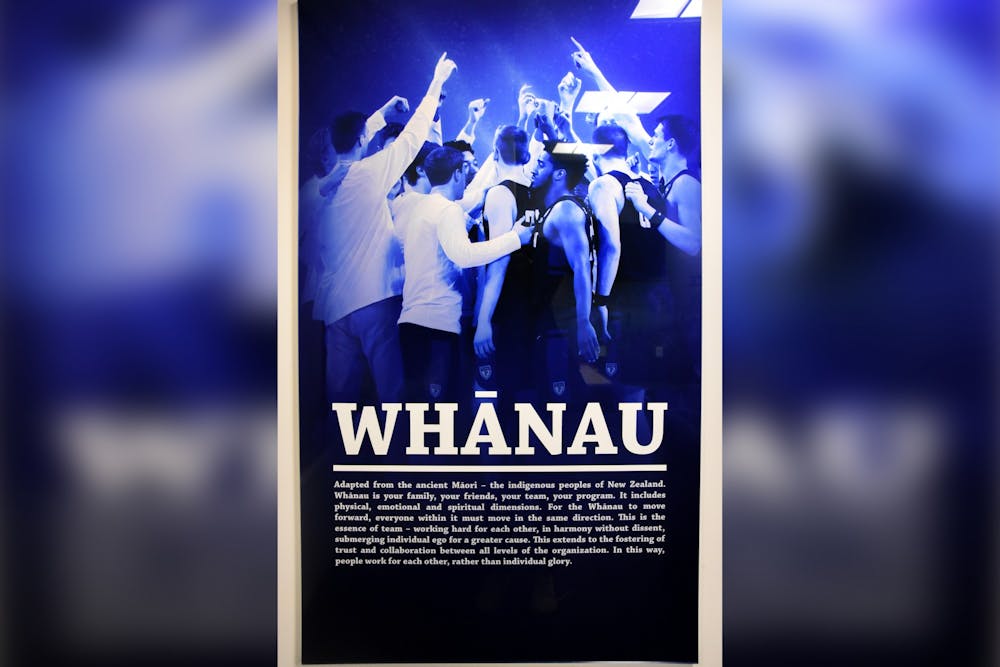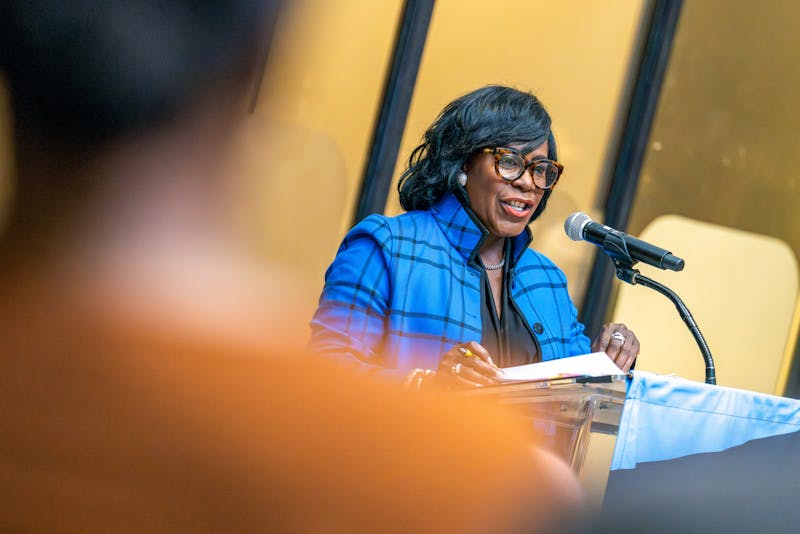
AJ Brodeur has 12 points for Penn at the end of the first half.
Credit: Chase SuttonWhat do New Zealand’s national rugby team – the All Blacks – and Penn men’s basketball have in common? The answer comes in the form of a simple Māori word: whānau, which loosely translates to “extended family" in English.
The word was introduced to Penn by coach Steve Donahue, who, after spending four years as the coach for Boston College, decided to re-evaluate the way he approached building a basketball program.
“After I was let go by BC, I just took a real personal evaluation of what went right and what didn’t, and I was not pleased with the culture I created at BC,” Donahue said.
During this re-evaluation, Donahue stumbled upon a book that would simultaneously change the way he approached coaching a basketball team and inspire the foundation upon which he would build his program at Penn.
“I ended up reading a book called 'Legacy' about the All Blacks, the New Zealand rugby team, one of the most dominant professional teams in any sport,” Donahue said. “It just clicked with me, all the things I was looking for.”
'Legacy' is the story of the All Blacks, the current Rugby World Cup Champions and the most successful rugby squad at the international level. It was written by author James Kerr, who wrote the book to find out not only what made the All Blacks different from other teams, but also what enabled the team’s success.
One major factor in the All Blacks' success cited by the book was whānau, the word that Donahue would eventually build his program upon.
“[For our program], whānau means not only do we have each other, but we have everybody else that needs to be involved spiritually, emotionally, physically,” Donahue said. “We all have to be a part of this, and eventually, it’s we not me. That’s how we drive everything that we do.”
Whānau has become the pillar of the culture of the Penn men’s basketball program It is something players are exposed to as soon as they enter the program. However, rather than providing a dictionary definition of whānau and what it is supposed to mean, Donahue prefers to teach the concept by example.

The "WHĀNAU" poster in coach Donahue's office.
“It was introduced to all of us not as a concept that has [a dictionary] definition, but [as something] that comes from the guys who show it and exemplify it,” senior forward AJ Brodeur said. “You kind of learn what it is just by everyone acting it. It is definitely a big culture thing that is easier to be lived than it is to be taught.”
Whānau has allowed everyone involved with the program to have a role in the team’s success, even if their role does not directly involve making big plays at the Palestra with the game on the line.
“Whether that’s guys like our sports information department, whether its administration, or whether it’s janitors, [everyone has] that feeling that you have in your gut that this means a lot to all of us, and ‘I’m going to do whatever I can to make this happen,’” Donahue said.
The culture has also allowed the team’s role players, who do not get the traditional playing time that stars like Brodeur have, to play an important role in the team’s success.
“Especially in our championship season two years ago, [there were guys] who didn’t play as much during the year who were pivotal to our success because of what they brought every day,” Brodeur said. “They left their ego at the door, and they came to the gym every day to help this team be a championship team.”
In the Ivy League, culture can play a large part in a team’s success. The nature of the League’s season, which involves tough weekend road trips across the northeast, demands that teams have a strong culture to fall back upon.
Thanks to Donahue’s emphasis on building a strong culture at Penn, whānau has established the all-for-one and one-for-all attitude that will help the Quakers to succeed both on and off the court.
The Daily Pennsylvanian is an independent, student-run newspaper. Please consider making a donation to support the coverage that shapes the University. Your generosity ensures a future of strong journalism at Penn.
Donate






